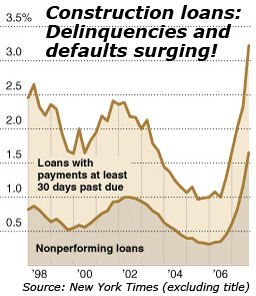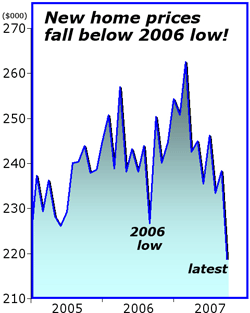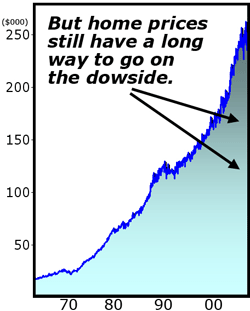Fed US Interest Rate Cut Tomorrow: Too Little, Too Late
Housing-Market / US Housing Dec 10, 2007 - 12:04 PM GMT Martin Weiss writes:When Dad and I gave our last seminar together, the median price of a new home in the U.S. was under $140,000.
Martin Weiss writes:When Dad and I gave our last seminar together, the median price of a new home in the U.S. was under $140,000.
To buy one, you had to put 20% down.
No one had heard of option mortgages, no-doc mortgages or companies like Countrywide Financial that created them.
Few dreamed the American housing market could turn into a great bubble — let alone a great bust.
Today, much has changed.
More than ever in my lifetime, or my father's ...
America Has Become a Credit-Addicted Society, And That Credit Is Quickly Disappearing ... or Going Bad.
For years, Americans borrowed like there was no tomorrow, piling up the biggest mountain of mortgages and consumer debt — with the smallest savings — of any modern society in history.
Now, suddenly, credit standards for mortgages (prime or nonprime) have tightened. With rare exceptions, getting one today is now more difficult, more expensive, or both.
And with equal suddenness, the mortgage virus is spreading to virtually every other form of credit, including:
Auto loan delinquencies have surged to highest level in several years. Lenders are tightening terms. And despite the Fed's rate cutting, auto loan rates have actually been moving higher.
Even auto loans made to top-rated borrowers are going bad: In August, 2.9% were past due by 30 days or more. Just one month later, that delinquency rate had surged by 55% — to 4.5%, its biggest one-month jump in eight years.
Among subprime borrowers, a whopping 12% were behind in their auto loan payments.

Construction loans have suffered a similar fate. Just in the last year, the percentage of loans 30 days past due has more than tripled, while the percentage considered nonperforming has risen by more than five times.
With mid-size and small banks across the country holding more construction loans than capital, this is not a trivial issue. It's likely to sink bank earnings, or worse.
Corporate credit is beginning to disappear, especially for junk, or speculative grade, borrowers. And for good reason: Moody's says the default rate in this category will more than quadruple next year.
That's assuming the U.S. economy gets by with just a slowdown — no recession. If we have a recession, says Kenneth Emery, director of corporate default research at Moody's, the default rate could be closer to 10%, or ten times recent levels.
Already, many companies, convinced they could always borrow from Peter to pay Paul, are running into the same problem as average homeowners: No refinancing available.
Their only choice: Default.
No Wonder the Cost of Default Insurance Is Going Through the Roof!
Default insurance — plus the credit derivatives I told you about last week — provide the glue that holds the nonprime world together.
Without it, how many banks would speculate with the high-risk mortgages, bonds or loans? Certainly not enough to make a viable market.
That's where default insurance came in. Default insurance was supposed to make everyone happy — borrowers, lenders and investors.
Problem: The cost of default insurance after the latest mortgage meltdown is surging like the cost of homeowner's insurance after Katrina. In many cases, the coverage costs have suddenly doubled and tripled ... or simply can't be bought.
Now comes the coup de grâce ...
Moody's Getting Ready to Downgrade The World's Largest Bond Insurer
For the first time in history, Moody's has signaled its readiness to downgrade one of the nation's leading bond insurance companies due to massive losses in the mortgage-backed securities it covers.
Moody's expects the dramatic increase in defaults on high-risk subprime home loans to use up so much of the insurer's cash that it will be unable to make good all the payments required on some of the mortgage bonds it insures.
The potential domino-like repercussions are incalculable; the reasons, three-fold:
Reason #1. The company on the ratings chopping block is MBIA, the largest bond insurer in the world . Just based on its size alone, the shock waves could be enormous.
Reason #2. MBIA insures $653 billion in tax-exempt municipal bonds and mortgage-backed securities. If it's downgraded, virtually all of those of bonds will be automatically downgraded — in one fell swoop.
Reason #3. If the rating agencies downgrade MBIA, they're likely to downgrade the nation's other three leading bond insurers as well, toppling several rows of dominos.
The Times of London puts it this way:
"Other large mortgage bond insurers, such as Ambac, Security Capital Insurance and Financial Guaranty Insurance, are also likely to find themselves short of capital ...
"The possibility that MBIA and other insurers may not be able to honor their payment guarantee — reflected in talk of a downgrade of its own credit rating — will automatically push down the prices of all the bonds it insures. The resulting rise in bond interest rates would fuel the credit crunch, making it harder and more expensive to borrow money and putting further pressure on the economy.
"It would also saddle holders of bonds they insure with billions of dollars of additional losses.
"The loss suffered by Wall Street banks alone on subprime mortgage-backed bonds could more than double to about $110 billion as a result."
We Warned You About This Scenario. Now It's Beginning to Unfold!
Four weeks ago, in " Next Phase of the Crisis: The Great Ratings Debacle ," Mike and I explained why this is so critical:
"The big three rating agencies have forever issued stellar, triple-A ratings to four specialized insurance companies — Ambac, MBIA, CIFG, and FGIC — the companies that insure bonds and other credits from default.
"Traditionally, they covered mostly tax-exempt municipal bonds. If a city or state defaulted, they'd step in and make good on the payments. But few cities or states defaulted.
"So the muni default insurance seemed to work. And no one ever talked seriously about downgrading bond insurers like Ambac or MBIA.
"But in recent years, in tandem with the housing bubble, the bond insurers have also insured massive amounts of mortgage-backed securities and other CDOs, a large percentage of which are in default ... or soon will be.
"So this time the default insurance is not working. It's an unbridled disaster. And the triple-A ratings of bond insurers are about to collapse.
"This is no trivial matter. It directly impacts $2.3 trillion worth of municipal bonds, mortgage-backed bonds, plus asset-backed bonds packed with credit card and auto loans — the same kind of securities that are now collapsing.
"And it indirectly impacts the entire credit markets. Indeed, we believe it could be the watershed event that drives the next major phase of the credit crunch."

Home Price Decline Still Has a LONG Way to Go
This brings me back full circle to the genesis of the crisis — the U.S. housing bust.
Back in April 2006, the median price of a new home reached a temporary peak of $257,000 ... and then declined to a temporary bottom of $226,700 in September.
At the time, this raised some concerns, but prices promptly bounced back and made a new high of $262,600 in March of this year.
And that's when the price decline began in earnest — to $242,500 in April ... $235,500 in June ... and now $217,800 in October, well below its 2006 low.
Pay close attention. Because this price decline is a key factor in the surging mortgage defaults ... the spreading credit crunch ... and, as I demonstrated last week, even the possibility of a money panic. (See " Dangerously Close to a Money Panic .")

But if you think there's evidence home prices are nearing a bottom, take another look.
Yes, they've already come down more than at any time in recorded history. But from a broader historical perspective, you can see that they are still relatively near their all-time peak.
Indeed, it's fair to say that the recent housing bubble was just the climax of a home price boom that began decades ago — fueled by an ever-larger infusion of credit, an ever-taller mountain of debt.
And today, as I said at the outset, that credit is being withdrawn. So unless it magically starts pouring back into this market, it's far too soon to talk about a bottom.
Don't Expect the Fed's Rate Cuts This Week to Turn This Around
In a desperate attempt to stem the tide, the Fed is going to cut its key interest rates tomorrow by one quarter — or even one half — point. And to try to ease frazzled nerves, it's going to pump a new wave of fresh cash into the banking system.
But it will be too little, too late.
Remember: Putting money in the hands of bankers is one thing. Persuading them to lend it out in this high-risk environment is another entirely.
Instead, the more likely consequences of the Fed's rate cuts will be ...
A flight to quality as investors rush to the safety of Treasuries and Treasury-only money market funds. My recommendation: Stay ahead of the crowd with funds such as ...
- American Century's Capital Preservation Fund
- U.S. Global's U.S. Treasury Securities Cash Fund
- Our affiliate's Weiss Treasury Only Money Market Fund
These funds have never owned — and never will own — the assets that are at the core of the mortgage crisis. They invest exclusively in the highest quality, most liquid and most secure assets in the world — short-term U.S. Treasury securities or equivalent.
A flight from the dollar as investors rush into crisis currencies like the Japanese yen. My recommendation: Consider diversifying your cash assets with foreign currencies. For conservative funds, you can use currency ETFs issued by Rydex Funds; and for speculative funds, consider World Currency Options™ traded on the Philadelphia Exchange.
A flight from all forms of paper money into hard assets like gold. My recommendation: If you don't already, be sure to allocate some funds to gold in various forms, including gold ETFs like the streetTRACKS Gold Shares (GLD), plus other natural resource investments.
A flight from real estate. Remember: It wasn't that long ago when the median price of a home was less than $100,000. Today, it's over $200,000. And if there's a rush to dump homes on the market, no one can say where the bottom might be. My recommendation: If you're vulnerable to further real estate declines, buy protection with inverse ETFs such as UltraShort Real Estate ProShares (SRS).
A final word: The United States has been through worse before, and we're still here. We will survive this crisis as well.
More importantly, if you take the right steps, you can continue to prosper and grow your wealth, opening up the opportunity for great bargains in the months ahead.
Good luck and God bless!
Martin
This investment news is brought to you by Money and Markets . Money and Markets is a free daily investment newsletter from Martin D. Weiss and Weiss Research analysts offering the latest investing news and financial insights for the stock market, including tips and advice on investing in gold, energy and oil. Dr. Weiss is a leader in the fields of investing, interest rates, financial safety and economic forecasting. To view archives or subscribe, visit http://www.moneyandmarkets.com .
Money and Markets Archive |
© 2005-2022 http://www.MarketOracle.co.uk - The Market Oracle is a FREE Daily Financial Markets Analysis & Forecasting online publication.



